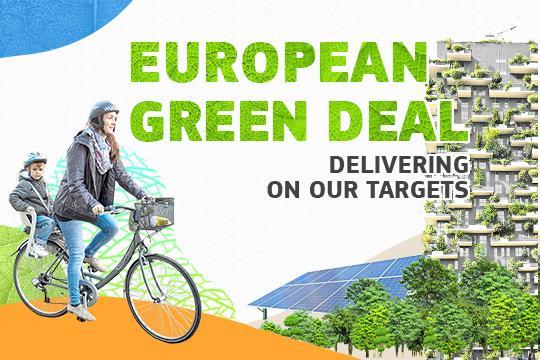
The European Commission has today adopted a package of proposals to make the EU's climate, energy, land use, transport and taxation policies fit for reducing net greenhouse gas emissions by at least 55% by 2030, compared to 1990 levels.
Achieving these emission reductions in the next decade is crucial to Europe becoming the world's first climate-neutral continent by 2050 and making the European Green Deal a reality. With today's proposals, the Commission is presenting the legislative tools to deliver on the emissions reduction targets agreed in the European Climate Law and fundamentally transform our economy and society for a fair, green and prosperous future.
A comprehensive and interconnected set of proposals
Today's proposals will enable the necessary acceleration of greenhouse gas emission reductions in the next decade. They combine: application of emissions trading to new sectors and a tightening of the existing EU Emissions Trading System; increased use of renewable energy; greater energy efficiency; a faster roll-out of low emission transport modes and the infrastructure and fuels to support them; an alignment of taxation policies with the European Green Deal objectives; measures to prevent carbon leakage; and tools to preserve and grow our natural carbon sinks.
The climate-related proposals contained within the package will support a steep reduction in greenhouse gas emissions over the next decade by:
- increasing the ambition of the existing EU Emissions Trading System (EU ETS)
- making necessary adjustments to the Market Stability Reserve
- extending the EU ETS to the maritime sector
- implementing CORSIA for aviation
- establishing a new ETS to cover emissions from fuels used in buildings and road transport
- increasing Member State emission reduction targets in a fair and cost-effective way
- introducing new, more ambitious EU fleet-wide CO2 emission targets for new cars and vans from 2030 onwards
- putting the land sector on track towards climate neutrality
- providing dedicated funding to Member States to help citizens finance investments in energy efficiency, new heating and cooling systems, and cleaner mobility
Background
The European Green Deal, presented by the Commission on 11 December 2019, sets the goal of making Europe the first climate-neutral continent by 2050. The European Climate Law, which enters into force this month, enshrines in binding legislation the EU's commitment to climate neutrality and the intermediate target of reducing net greenhouse gas emissions by at least 55% by 2030, compared to 1990 levels. The EU's commitment to reduce its net greenhouse gas emissions by at least 55% by 2030 was communicated to the UNFCCC in December 2020 as the EU's contribution to meeting the goals of the Paris Agreement.
The Commission has conducted extensive impact assessments before presenting these proposals to measure the opportunities and costs of the green transition. In September 2020 a comprehensive impact assessment underpinned the Commission's proposal to increase the EU's 2030 net emissions reduction target to at least 55%, compared to 1990 levels. It showed that this target is both achievable and beneficial. Today's legislative proposals are supported by detailed impact assessments, taking into account the interconnection with other parts of the package.
For more information
Details
- Publication date
- 14 July 2021
- Author
- Directorate-General for Climate Action
